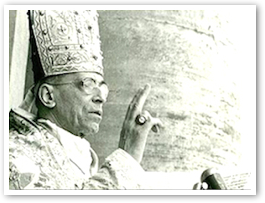Why make him a saint?
- FATHER RAYMOND J. DE SOUZA
Regarding the decision to advance Pope Pius XII along the path to canonization, one of the worlds leading Vatican analysts put the question very simply: Why?
 |
Pope Pius XII
1876-1958 |
"Whether or not Pius was 'silent' on the Holocaust, the obvious question is: Why would the church want to make him a saint in the first place?" John L. Allen Jr. asked this week in the National Catholic Reporter. "There is, of course, abundant literature on the role of Pius XII during the Second World War, and plenty of reasonably neutral observers believe the evidence doesn't support an indictment. To say that Pius XII was not 'Hitler's Pope,' however, is hardly the same thing as placing a halo on his head. Lacking any clear sense of what the positive case might be for canonizing Pius XII, many people might reasonably ask that if sainthood is sure to offend a broad swath of Jewish opinion, and to create yet another black eye for the church in PR, why do it?"
It's a very good question. Indeed, this week the Vatican issued a statement reminding people that judging Pius to be worthy of canonization -- canonization itself requires two authenticated miracles and is years away -- is not a sort of retroactive endorsement of all his policies. The statement quoted Pope John Paul II on the occasion of his beatifying Pope Pius IX and Pope John XXIII:
"Holiness lives in history and no saint has escaped the limits and conditioning which are part of our human nature. In beatifying one of her sons, the Church does not celebrate the specific historical decisions he may have made, but rather points to him as someone to be imitated and venerated because of his virtues, in praise of the divine grace which shines resplendently in them."
With popes the historical questions cannot be entirely avoided. Indeed those questions have likely influenced Benedict to proceed as he has.
First, as someone whose family suffered as the hands of the Nazis, Benedict vigorously rejects any attempt to blame all Christians, or all Germans, for the horrors of the Nazis. Many of Pius's critics -- perhaps more in the Church than in the Jewish community -- often argue that of course Pius did not do enough to help the Jews because Catholicism is root-and-branch anti-Semitic.
Second, Benedict -- in this case reflecting the overwhelming consensus in the Vatican -- believes that to argue that Pius was indifferent to, or complicit in, the Holocaust, is a monstrous historical slander. Whether he should have conducted wartime diplomacy differently in occupied Rome is an open question, but to lay at his feet responsibility for the murder of Jews is an offence against justice and truth. If that slander is the only thing standing in the way of Pius's cause, then to delay is to give it credence it does not deserve. Perversely then, the clamour against Pius has likely foreclosed the option of giving the file a few decades of benign neglect.
Third, there is a prevalent tendency in the Catholic world to think that everything started in 1962 with Vatican II, and that the previous 19 centuries of Catholic life were left behind as a butterfly breaks free of its cocoon. Benedict has devoted his entire papacy to correcting that notion, arguing that contemporary Catholic life must be understood in continuity with all that came before. Hence his desire to give the "preVatican II" Mass a place in today's liturgical practice. Pius XII is a figure of continuity. A man trained in the old ways of Vatican diplomacy, his teaching on liturgy, the Church, anti-totalitarianism, evolution and bioethics prepared the ground for much of what came after.
. . . Benedict's preferred modus operandi, whether with Muslims, Anglicans or with dissident Catholics, is to confront the central and most difficult issues head on. That he would do so regarding Pius XII is true to form. |
Fourth, on the question of CatholicJewish relations, there are few who have done more than Joseph Ratzinger/Benedict to affirm the validity of the Jewish covenant in Catholic teaching, and to achieve the warm relations that exist today. Benedict celebrates all this, but he would insist that it is not utterly new, dependent purely on John Paul's or his own initiative. Despite the well-known offenses against Jews in Catholic cultures, Benedict would argue that in fostering good relations with our "elder brothers" the Church is better living her authentic tradition. For example, the universal catechism that Ratzinger produced in 1992 pointed out that the 16th-century catechism of the Council of Trent already condemned assigning collective responsibility to the Jews for Christ's crucifixion.
Fifth and finally, Benedict's preferred modus operandi, whether with Muslims, Anglicans or with dissident Catholics, is to confront the central and most difficult issues head on. That he would do so regarding Pius XII is true to form. He will do so more broadly when he visits the Synagogue of Rome next month.
 This is J. Fraser Field, Founder of CERC. I hope you appreciated this piece. We curate these articles especially for believers like you.
This is J. Fraser Field, Founder of CERC. I hope you appreciated this piece. We curate these articles especially for believers like you.
Please show your appreciation by making a $3 donation. CERC is entirely reader supported.

Acknowledgement
Father Raymond J. de Souza, "Why make him a saint?" National Post, (Canada) December 26, 2009.
Reprinted with permission of the National Post and Fr. de Souza.
The Author
Father Raymond J. de Souza is the founding editor of Convivium magazine.
Copyright © 2009 National Post

